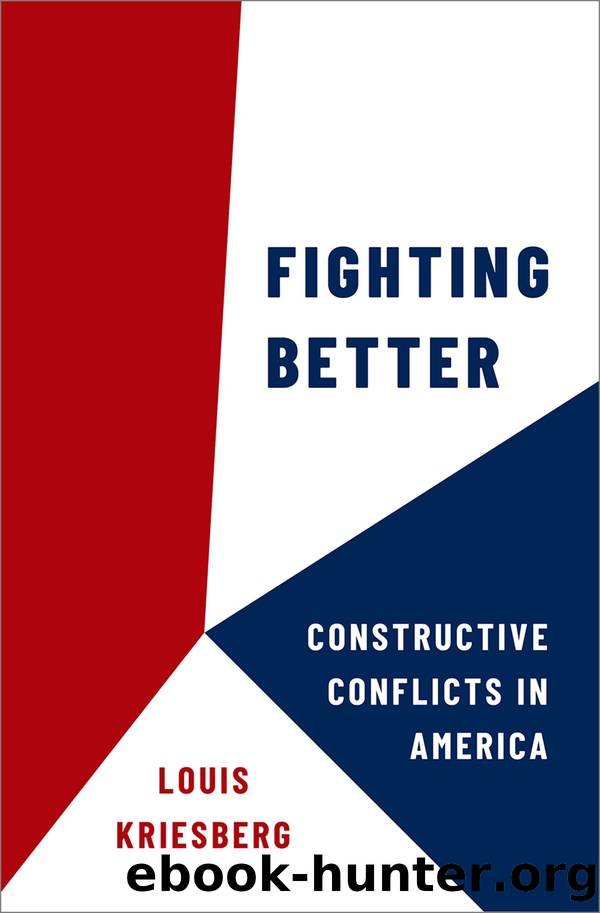Fighting Better by Louis Kriesberg;

Author:Louis Kriesberg;
Language: eng
Format: epub
Publisher: Oxford University Press USA
Published: 2022-02-15T00:00:00+00:00
Conclusions
Status differences are important sources of conflicts, many of them seemingly destructively intractable. There is much commentary about the difficulties in resolving culture conflicts and bewailing the prevalence of âculture wars.â Nevertheless, we have seen in this chapter that there have been remarkable transformations in the ranking of members of some collective identities that historically were devalued and oppressed. Often, an important component of such movements toward greater equity is the activism of members of the low-regarded collective identity community. They begin acting as if they deserve and are getting better regard from higher-ranking communities. They seek and require greater respect and the perquisites of higher status.
The response of higher-status communities is not always simple opposition and repression. The solidarity of the opponents is often fractured. The costs of acknowledging a rise in the status of the previously low-ranked identity are recognized as small. Indeed, there may be benefits in rising shared gains. Indeed, some people feel better for acting better to and with other humans or simply other Americans.
I share an extreme instance, with an anecdote. I visited South Africa in June 1998, when the hearings of the Truth and Reconciliation Commission were closing down. In my conversations with many Afrikaners, I was struck that most were accepting of the radical transformation that was taking place in the status and power of Whites relative to Blacks. Indeed, many expressed their pride that apartheid had ended nonviolently, and Afrikaners acceded to its ending. When I left South Africa, I happened to sit on the plane alongside a young man, an Afrikaner, who was leaving South Africa to live in Europe. He explained that he anticipated that his professional career would be capped now in South Africa, as Blacks moved up. However, he went on, that was right. Apartheid was wrong, and he was gratified by the change.
Of course, the linkages of conflicts are often quite different. A conflict that results in a step forward is followed by a backlash from the side pushed back, forcing the previous advancers to move one or two steps backward. Perhaps the fighters who had made a sizable step forward are viewed as having overreached, arousing fear and anger that energized a fierce reaction. Or the step forward had been modest in the eyes of the opposing side and therefore perhaps a sign of weakness and vulnerability, thereby prompting a strong counterattack. Often, conflicts result in one side moving two steps forward, which is followed by a conflict that results in one step back. Insofar as mutual gains are made and recognized, backlashes will be minimized.
There are no formulas predicting the way one conflict will be linked to the next outbreak. It depends very much on the resources, aspirations, and perceptions of the opponents. Using a constructive conflict approach would entail considering the alternative likely responses from the other side to reaching for one goal or another. This suggests the utility of some exploratory undertakings to learn about outcomes that would be stable. These matters will be examined further in the next chapter, which traces the ongoing struggles for power.
Download
This site does not store any files on its server. We only index and link to content provided by other sites. Please contact the content providers to delete copyright contents if any and email us, we'll remove relevant links or contents immediately.
Chaco's Northern Prodigies : Salmon, Aztec, and the Ascendancy of the Middle San Juan Region after AD 1100 by Paul F. Reed(334)
Law Enforcement Interpersonal Communication and Conflict Management by Brian Douglas Fitch(330)
Digital International Relations by Unknown(323)
Critical Perspectives on Human Security : Rethinking Emancipation and Power in International Relations by David Chandler; Nik Hynek(311)
Skilled interpersonal communication: Research, theory and practice, Fifth edition by Owen Hargie(307)
The Enduring Color Line in U.S. Athletics by Krystal Beamon Chris M. Messer(305)
Evidence-Based Policy Making in Labor Economics by Hamermesh Daniel S.;Nottmeyer Olga K.;Nottmeyer Olga;King Sarah;King Sarah;King Sarah;(272)
EPSO CAST Political affairs EU policies: How to succeed in the selection procedure by Franco Reverte José María(267)
Writing Public Policy - A Practical Guide to Communicating in the Policy Making Process by Catherine F. Smith(252)
Threshold Concepts in Women's and Gender Studies by Christie Launius Holly Hassel(246)
Criminological Theory in Context by John Martyn Chamberlain(246)
Tibeton Yoga Its Secret Doc by Evans-Wentz(244)
Social Problems, Social Issues, Social Science by James Wright(242)
Positive Psychology and Spirituality in Counselling and Psychotherapy (Conflict, Ethics, and Spirituality, 12) by unknow(241)
Rothschild and Early Jewish Colonization in Palestine (Geographical Perspectives on the Human Past) by Ran Aaronsohn(240)
Play in child development and psychotherapy: toward empirically supported practice by Sandra W. Russ(232)
Cognitive Development in Infancy and Childhood (Elements in Child Development) by Mary Gauvain(232)
Latin American Politics and Society by Gerardo L. Munck & Juan Pablo Luna(206)
What Makes a Social Crisis?: The Societalization of Social Problems by Jeffrey C. Alexander(206)
